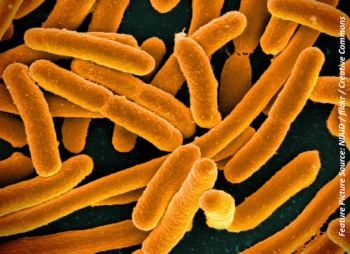
Gepotidacin, a potential first-in-class antibiotic, will be evaluated for the treatment of uUTIs and urogenital gonorrhea in the EAGLE studies.

Gepotidacin, a potential first-in-class antibiotic, will be evaluated for the treatment of uUTIs and urogenital gonorrhea in the EAGLE studies.

Study results point toward progress in developing an accessible and effective point-of-care TB test.

Both organizations will invest $100 million to develop and advance candidate gene-based cures for HIV and sickle cell disease to clinical trials within 10 years.

A study by Shikha Garg, MD, MPH, and her team with the US Centers for Disease Control and Prevention boosts the evidence base for the benefit of influenza vaccination.

Comparisons between strains show little crossover between ESBL-E coli in meat and in humans.

Universal screening identifies cases in those who do not consider themselves at risk and helps re-link previously known patients who have fallen out of treatment back to care.

Here is a look at infectious disease-related US Food and Drug Administration (FDA) news from the week of October 20, 2019.

We’ve rounded up a list of important US Food and Drug Administration (FDA) and US Department of Agriculture (USDA) recalls from this past week.

Stay up-to-date on the latest infectious disease news by checking out our top 5 articles of the week.

The presence of segmented filamentous bacteria in the gut microbiota could protect against rotavirus infection, according to new research from Georgia State University.

Although use of gowns and gloves in targeted settings may still be helpful in preventing health care-associated infections, contact precaution policies in VA long-term care facilities had no impact on MRSA acquisition.

According to the WHO’s latest Global TB Report, more than 7 million individuals received treatment for the disease in 2018, but funding gaps could stall progress toward ending TB by 2030.

The supplemental new drug application was approved based on results of a phase 3 trial in which IV-to-oral delafloxacin met the primary end point of statistical non-inferiority to moxifloxacin.

A medication that secretes growth hormone is shown to reduce liver fat in an HIV-positive population, and investigators would like to see it used more widely.

What hurdles are companies facing in the pursuit of developing new antibiotics against multidrug-resistant organisms?

Results from a study at a Cincinnati hospital point to the importance of testing at-risk infants for HCV as the opioid crisis impacts prevalence of the infection.

H3N2, a particularly virulent strain of influenza, blew through Australia. Is it coming to the United States this fall and winter?

A new study points to an increased risk for infections in patients with PTSD.

Leaders from the WHO and various impacted countries met to assess the risks of the Ebola outbreak in the Democratic Republic of the Congo and the future of the outbreak response.

A group provides an overview of ongoing research and current approaches being evaluated for the prevention of tick-borne disease.

Helicobacter pylori resistance to clarithromycin more than doubled during the past 20 years, according to new research presented at UEG Week Barcelona 2019.

Kindergarten vaccination coverage is near the recommended 95%, but nonexempt holdouts, which could be addressed, can still lead to outbreaks.

Scientists from the National Institutes of Health are hopeful that diluting a dose of the VSV vaccine could be efficacious and stretch vaccine supplies even further.

A large majority of sepsis patients are pathogen-negative, yet empiric prescribing of antibiotics varies significantly from patient to patient.

Using a unique approach of targeting the stalk of the hemagglutinin, investigators are taking steps toward developing a universal influenza vaccine candidate.

Given a general rise in STD cases, clinicians treating ESRD may have to pay special attention to possible coinfections.

Eravacycline may be an option for patients with a history of C diff or those with a history of infections who are at risk for developing the infection.

Pooled analysis linked baseline demographics, including lower CD4 count, higher HIV-1 RNA, no history of injection drug use, female sex, and black race, to weight gain following ART initiation.

The ECDC 2019 plan to address multi- and extensively-drug resistant gonorrhea has been released.

Here is a look at infectious disease-related US Food and Drug Administration (FDA) news from the week of October 13, 2019.